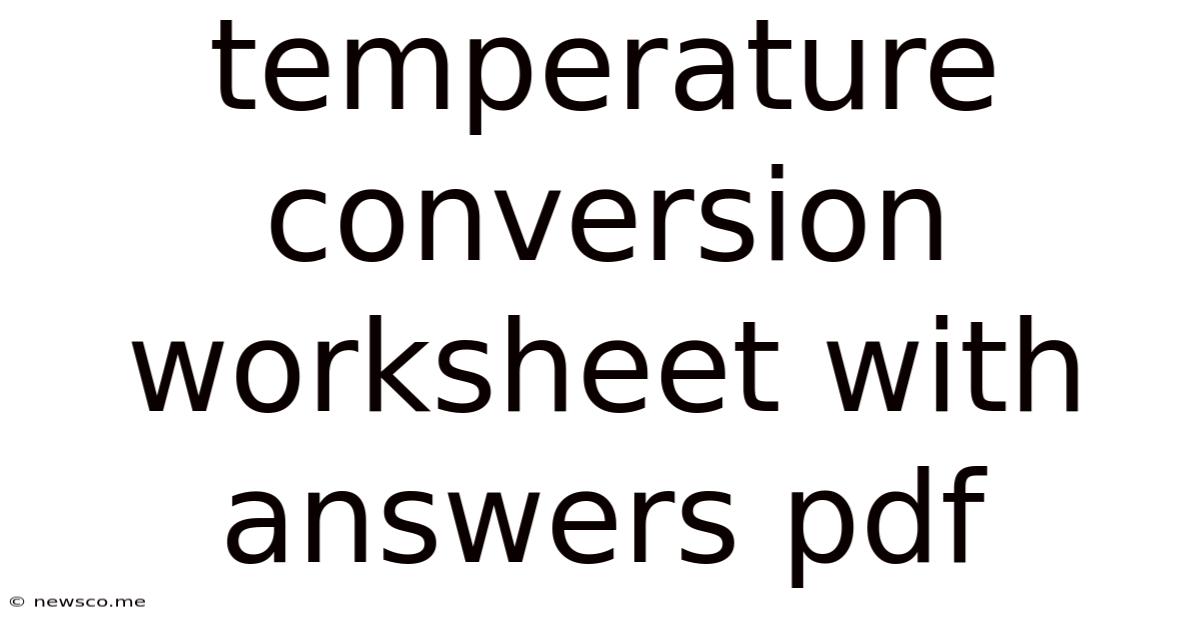Temperature Conversion Worksheet With Answers Pdf
News Co
Apr 16, 2025 · 5 min read

Table of Contents
Temperature Conversion Worksheet with Answers PDF: A Comprehensive Guide
Are you looking for a comprehensive resource to master temperature conversions? This guide provides everything you need, from understanding the fundamental concepts to practicing with a wide array of examples and a downloadable temperature conversion worksheet with answers. We'll delve into the different temperature scales, explain the conversion formulas, and offer tips and tricks to make the process smoother. Let's dive in!
Understanding Temperature Scales
Before we tackle conversions, let's clarify the three most commonly used temperature scales: Celsius (°C), Fahrenheit (°F), and Kelvin (K).
Celsius (°C)
The Celsius scale is part of the metric system and is widely used globally. Water freezes at 0°C and boils at 100°C at standard atmospheric pressure.
Fahrenheit (°F)
The Fahrenheit scale is primarily used in the United States. Water freezes at 32°F and boils at 212°F at standard atmospheric pressure.
Kelvin (K)
The Kelvin scale is the absolute temperature scale used in scientific applications. It starts at absolute zero, the theoretical point where all molecular motion ceases. 0 K is equivalent to -273.15°C or -459.67°F. There are no negative values on the Kelvin scale.
Conversion Formulas: The Key to Accuracy
Mastering temperature conversions hinges on understanding and accurately applying the correct formulas. Here are the most crucial ones:
Celsius to Fahrenheit
The formula to convert Celsius to Fahrenheit is:
°F = (°C × 9/5) + 32
This formula takes the Celsius temperature, multiplies it by 9/5 (or 1.8), and then adds 32 to get the equivalent Fahrenheit temperature.
Fahrenheit to Celsius
To convert Fahrenheit to Celsius, use this formula:
°C = (°F - 32) × 5/9
This formula reverses the process. It subtracts 32 from the Fahrenheit temperature, then multiplies the result by 5/9.
Celsius to Kelvin
Converting Celsius to Kelvin is straightforward:
K = °C + 273.15
Simply add 273.15 to the Celsius temperature to obtain the Kelvin equivalent.
Kelvin to Celsius
To convert Kelvin to Celsius, subtract 273.15:
°C = K - 273.15
This is the reverse of the Celsius to Kelvin conversion.
Practical Applications: Real-World Scenarios
Understanding temperature conversions isn't just about memorizing formulas; it's about applying them to real-world situations. Consider these examples:
- Cooking: Many recipes specify temperatures in either Celsius or Fahrenheit. Being able to convert between them ensures you achieve the desired results.
- Weather: Understanding temperature variations in different units helps interpret weather reports accurately.
- Science and Engineering: Precise temperature conversions are crucial in scientific experiments and engineering projects where accuracy is paramount.
- Medicine: Temperature readings are vital in medical contexts, and the ability to convert between units can prevent misinterpretations.
Temperature Conversion Worksheet: Practice Makes Perfect
The best way to solidify your understanding of temperature conversions is through consistent practice. Below is a sample temperature conversion worksheet. Try to complete it independently before checking the answers provided later in this document.
(Temperature Conversion Worksheet)
Instructions: Convert the following temperatures as indicated. Show your work.
Part 1: Celsius to Fahrenheit
- Convert 25°C to °F.
- Convert -10°C to °F.
- Convert 100°C to °F.
- Convert 0°C to °F.
- Convert 37°C to °F.
Part 2: Fahrenheit to Celsius
- Convert 77°F to °C.
- Convert 212°F to °C.
- Convert 32°F to °C.
- Convert 0°F to °C.
- Convert 98.6°F to °C.
Part 3: Celsius to Kelvin
- Convert 20°C to K.
- Convert -40°C to K.
- Convert 100°C to K.
- Convert 0°C to K.
- Convert 25°C to K.
Part 4: Kelvin to Celsius
- Convert 293K to °C.
- Convert 373K to °C.
- Convert 273K to °C.
- Convert 100K to °C.
- Convert 310K to °C.
(Answers to the Temperature Conversion Worksheet)
Part 1: Celsius to Fahrenheit
- 77°F
- 14°F
- 212°F
- 32°F
- 98.6°F
Part 2: Fahrenheit to Celsius
- 25°C
- 100°C
- 0°C
- -17.78°C
- 37°C
Part 3: Celsius to Kelvin
- 293.15 K
- 233.15 K
- 373.15 K
- 273.15 K
- 298.15 K
Part 4: Kelvin to Celsius
- 20°C
- 100°C
- 0°C
- -173.15°C
- 37°C
Tips and Tricks for Success
- Memorize the Formulas: Familiarize yourself with the conversion formulas to avoid errors.
- Use a Calculator: A calculator is helpful, especially for more complex conversions.
- Check Your Work: Always double-check your calculations to ensure accuracy.
- Practice Regularly: Consistent practice is key to mastering temperature conversions.
- Understand the Concepts: Don't just memorize the formulas; understand the underlying principles of each temperature scale.
Beyond the Basics: Advanced Conversions
While the basic conversions covered above are essential, you may encounter more complex scenarios. These might involve multiple steps, such as converting Fahrenheit to Kelvin or Kelvin to Fahrenheit, requiring the application of multiple formulas in sequence. Remember to take your time, break down the problem into smaller, manageable steps, and double-check your work.
Conclusion: Mastering Temperature Conversions
Temperature conversions are a fundamental skill across various disciplines. By understanding the different temperature scales, mastering the conversion formulas, and practicing regularly, you'll gain confidence and accuracy in performing these calculations. Remember to use the provided worksheet and answers to hone your skills and become proficient in converting between Celsius, Fahrenheit, and Kelvin. This comprehensive guide equips you with the knowledge and tools to confidently tackle any temperature conversion challenge. Good luck!
Latest Posts
Related Post
Thank you for visiting our website which covers about Temperature Conversion Worksheet With Answers Pdf . We hope the information provided has been useful to you. Feel free to contact us if you have any questions or need further assistance. See you next time and don't miss to bookmark.